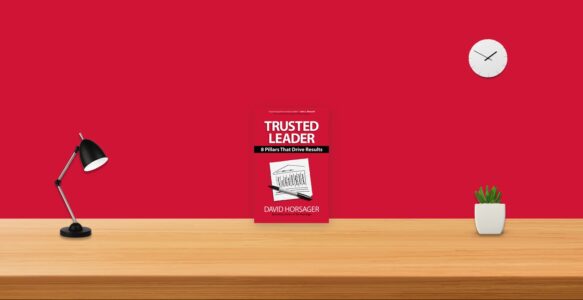Trust is your single most valuable asset. From personal relationships to financial institutions, everything of value is built on trust.
Here are a few findings from annual research publication, The Trust Outlook:
- The number one reason people give for wanting to work for an organization is trusted leadership. It is rated higher than a raise, good benefits, more autonomy, or a fun work environment.
- Most millennials would take a pay cut if they could trust their leadership.
- More than twelve million Americans have invested $100,000 or more based purely on trusting someone else.
- 85 percent say a high-trust environment helps them perform at their best.
- When employees trust senior leadership, they offer more ideas and solutions, are better team players, and are significantly more loyal.
- In a climate of trust, people are more willing to work together, be creative, share information, and stay motivated and productive. They demonstrate loyalty and a commitment to the team and are willing to go the extra mile to ensure success. Every aspect of the business becomes more profitable.
- With greater trust, customers will pay more, tell others, and return again and again. With suppliers whom we trust, one call is enough. Delivery time and costs decrease because there is less need for double-checking, paperwork, and follow-up.
Lack Of Trust Is Your Biggest Expense
Trust is not only your business’s most precious resource but also one of its most fragile. Just as increased trust can accelerate any business, organization, or relationship, so can mistrust erode, weaken, and ultimately destroy it.
Scan any company’s balance sheet, and you won’t see any column with the heading of “Trust.” It’s not something we typically think of as having an economic value per se. But scratch the surface of all those numbers, take a hard look at what is reflected in the data, and you find trust—or lack of trust—everywhere you look.
Trust is the root cause of every issue, and at the end of the day a lack of trust always costs money, whether that lack is costing time, attrition, stress, duplication of efforts, or productivity at first glance. The fastest way to go out of business is to lose trust.
Kickstarting Trust With 8 Pillars
Like the columns of a building, the pillars hold up the entire edifice. When one or more of the 8 Pillars is weakened, the structure itself is in danger of collapse.
The strength of the pillars the company did well in couldn’t make up for the weakness in all the others. This shows how important it is to diagnose organizational problems and arrive at the necessary remedies.
Pillar 1: Clarity
Clarity is the cornerstone of trust. We tend to trust someone when we know where they stand, and when they are clear in their words and actions. The more vague or ambiguous, the more
difficult it is to trust someone. This is why, for example, the military places an extreme value on clarity. It is nearly impossible to maintain a reliable chain of command structure unless all those involved trust their superiors—no matter what. And it is difficult to trust someone who is not crystal clear, especially when the stakes are high!
Strengthening the Clarity Pillar
- Make clear priorities
- Work in ninety-day plans
- Ask the most important question
- Communicate clear expectations
Pillar 2: Compassion
Who is the most trusted person in the world? By far the single most common answer is “Mom.” Why? It’s because mothers routinely sacrifice for their children. They are looking out for us. Similarly, why do we trust firefighters, nurses, and teachers? Because by the very nature of their jobs, they care for others, often at their own risk or expense. We trust people who put our interests ahead of their own
Compassion in business is more than a purely interpersonal priority. Increasingly, in our interconnected world, it is a global value. Every year, people are finding it harder to trust companies that don’t demonstrate they care about society, the environment, the disadvantaged, or the world at large. Show that you genuinely care about others, put their interests first, and you will stand out in your industry.
Strengthening the Compassion Pillar
- Practice the LAWS of Compassion (Listen, Appreciate, Wake up!, Serve Others)
- Make appreciation specific, personal, and authentic
Pillar 3: Character
It is no surprise that strong character is a necessary ingredient of trust. This applies to companies as well as individuals. While clarity and compassion have to do with what you do and how you do it, character cuts to the heart. People of high character are those who have integrity. They do what they say they will do. They tend to have a very strong moral compass. There may be differing views on what makes someone a good person, but most of us, especially within a single culture, share a fundamental sense of right and wrong. Leaders of high character tend to do the right thing even when it’s the more difficult path.
Strengthening the Character Pillar
- Identify your decision-making values
- Build an organization of character
Pillar 4: Competency
We tend to trust someone who we know can do the job. If you want your business to establish a strong and lasting foothold in the marketplace, there is no substitute for a high standard of competency. This also applies to leadership. What are you doing to stay relevant and capable? In the most recent publication of The Trust Outlook, the number one reason employees gave for trusting a leader is competency.
When you visit the dentist, you want to know that he or she knows how to perform a flawless root canal. This is a specific competency. But every field is rapidly evolving and with increasing speed. Specific competency has always been important, but in today’s world, continual education and growth is essential to maintaining competency.
Strengthening the Competency Pillar
- Create a plan for continuous learning
- Get involved in mentoring
- Encourage participation in mastermind groups
Pillar 5: Commitment
People trust those who keep their promises and do not trust those who fail to deliver on their promises. Building a business is never an easy task. It takes passion and hard work, and no matter how good a job you do, there will always be unexpected challenges. Yet it is precisely when those challenges arise that the real character of a company is revealed. It’s easy to be compassionate and treat your employees well when business is booming. However, what happens when a new competitor suddenly encroaches on your market share and you find yourself in a crunch?
The greatest leaders in history have been those who demonstrated an unwillingness to compromise when things got tough. Because of that, they were able to unite others in support of their cause. If you think of anyone who has left a lasting legacy on your life or on history—from a teacher to Martin Luther King Jr. to Gandhi to Jesus to Joan of Arc—you will find someone who was trusted and followed because of their commitment to a cause beyond themselves. Commitment yields devotion and loyalty. The executives and managers who succeed today do so often because they embody a spirit of unwavering commitment.
Strengthening the Commitment Pillar
- Make a habit of commitment in the little things
- Get clarity on your commitment
- Take responsibility for mistakes
- Make your commitments public
Pillar 6: Connection
At its core, trust is about relationships, and relationships are about connection. The surest, most durable way to build a sense of unity and team spirit is by fostering a culture of collaboration and partnership that builds upon individual, person-to-person connections.
In American culture, there is a hero worship of the solo entrepreneur, an ethos that says great things are achieved by the lone woman or man who scales the mountain all by herself or himself, the lone ranger.
This idea is exemplified by the phrase “It’s lonely at the top.” But if you’re lonely at the top, then you’re doing leadership wrong. You need a team. We all need teams. This is not to take away from the importance of leadership, but all great innovations and accomplishments are the result of powerful collaboration. Is it messy? Yes. Is it worth it? Absolutely
Strengthening the Connection Pillar
- Meet with people one on one
- Be a little more vulnerable
- Emphasize magnetic traits; eliminate repellant traits
- Ask curious questions
Pillar 7: Contribution
Contribution is about delivering results. We trust those who deliver the desired outcomes. It is the ultimate bottom-line measure of an individual’s value to the team, and the benchmark of the organization’s value to its audience or marketplace. The contribution pillar comes near the end of the list because that is “where the rubber meets the road.” You may have excellent character, care deeply about the people you work with, and be 100 percent committed to the team, but in the final analysis that does not matter if you consistently fail to deliver results. Be a caring, committed person of high character—and get things done.
The relationship between contribution and trust is self-reinforcing. Consistently delivering results is a sure recipe for gaining trust, and at the same time, working within an environment of higher trust will also lead to greater contribution from all its members.
Strengthening the Contribution Pillar
- Build a culture of contribution
- Identify Difference-Making Actions (DMAs)
Here are the three steps to implementing DMAs:
- First thing every morning, write down your most important current goal at the top of a blank page or sticky note.
- Write the numbers 1 through 5 down the left-hand side.
- Next to the 1, write the single most important action you can take today to achieve that goal, followed by the next one to four most important things on the other numbered lines. (Write down no more than five tasks.
Pillar 8: Consistency
Perhaps the most important thing to know about trust is that it is never static. Every transaction, every conversation, every encounter matters. Trust either increases or decreases with every interaction. It is this fact that makes trust so powerful and so essential. You can build trust in a moment, with even just one action. But one single inconsistency can change people’s perspective. Trust is fragile.
Consistency is the king of the pillars because it has dominion over all the others. Character once in a while is not character. Commitment only when times are good is not commitment. Compassion only to people who look like you is not compassion. If you deliver results sometimes, but not always, other folks will have a hard time trusting you.
Consistency is what builds the strength and trustworthiness of every other pillar.
Strengthening the Consistency Pillar
- Review your brand on a regular basis
- Build consistency by creating positive habits
The Final Problem
The problem is you can manipulate the 8 Pillars of Trust to appear trusted for a time without actually being worthy of it. What are we really going for? Trustworthiness! People might mistakenly trust a leader, but is the leader worthy of their trust? That is our goal, to be worthy of everyone’s trust.
That takes work every single day. Your friends, family, team, and staff—they need you. The world needs you. It’s noble work to become a trusted leader, and if you commit to this journey, you are guaranteed to flourish.


